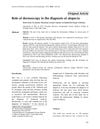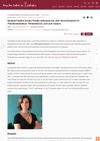 5 citations,
April 2022 in “Journal of Ethnopharmacology”
5 citations,
April 2022 in “Journal of Ethnopharmacology” Chinese herbal medicine can help treat hair loss by promoting hair growth and preventing cell death, maintaining a balance between hair growth and loss.
 3 citations,
January 2021 in “Skin appendage disorders”
3 citations,
January 2021 in “Skin appendage disorders” Trichoscopy is useful for correctly diagnosing tinea capitis in adults with unexplained hair loss.
 3 citations,
January 2019 in “International Journal of Trichology”
3 citations,
January 2019 in “International Journal of Trichology” The article concludes that treating hair loss requires careful research, understanding the causes, and personalized treatment plans.
 3 citations,
May 2018 in “Italian journal of dermatology and venereology”
3 citations,
May 2018 in “Italian journal of dermatology and venereology” The lotion with N1-methylspermidine and Sandalore® effectively reduces hair loss and promotes hair growth.
 2 citations,
August 2022 in “Reproductive Biology and Endocrinology”
2 citations,
August 2022 in “Reproductive Biology and Endocrinology” Magnesium supplements improved quality of life for women with polycystic ovary syndrome, but didn't help with acne, hair loss, or abnormal bleeding.
 2 citations,
June 2016 in “PubMed”
2 citations,
June 2016 in “PubMed” An 11-year-old girl with compulsive hair pulling was successfully treated with therapy and medication.
1 citations,
February 2024 in “Diversity” African plants can treat hair issues and may help with diabetes.
 1 citations,
October 2022 in “JCI insight”
1 citations,
October 2022 in “JCI insight” Deleting the BRD4 protein in certain skin cells causes hair loss and skin inflammation.
1 citations,
November 2020 in “Cureus” Clinical signs of hyperandrogenism are related to female pattern hair loss severity, but biochemical markers are not.
1 citations,
January 2020 in “Microscopy research” Researchers successfully grew hair follicle stem cells from mice and humans, which could be useful for tissue engineering and regenerative medicine.
 1 citations,
October 2021 in “Clinical, Cosmetic and Investigational Dermatology”
1 citations,
October 2021 in “Clinical, Cosmetic and Investigational Dermatology” Vitamin B3 may help prevent hair loss and promote hair growth by protecting scalp cells from stress and reducing hair growth-blocking proteins.
 1 citations,
December 2018 in “Journal of Pakistan Association of Dermatology”
1 citations,
December 2018 in “Journal of Pakistan Association of Dermatology” Dermoscopy is useful for diagnosing different types of hair loss.
Media coverage led to more dermatologists prescribing low-dose oral minoxidil for hair loss.

Changes in gut and skin bacteria are linked to different hair loss conditions, and treatments like fecal transplants and probiotics might help, but more research is needed.
 August 2023 in “Stem Cell Research & Therapy”
August 2023 in “Stem Cell Research & Therapy” A substance called Cell-free fat extract can effectively treat common hair loss by increasing hair growth and density.
 March 2022 in “IntechOpen eBooks”
March 2022 in “IntechOpen eBooks” Botulinum Neurotoxin-A can treat acne, oily skin, rosacea, hair loss, prevent scars, relieve nerve pain, reduce excessive sweating, and manage psoriasis, but more trials are needed to confirm its effectiveness.
 January 2020 in “Der Pharmacia Lettre”
January 2020 in “Der Pharmacia Lettre” Nanoparticle-based herbal remedies could be promising for treating hair loss with fewer side effects and lower cost, but more research is needed.
 December 2015 in “Vascular Pharmacology”
December 2015 in “Vascular Pharmacology” Hair papilla cells are crucial for blood vessel development in hair follicles, affecting hair growth and loss.
 January 2015 in “Springer eBooks”
January 2015 in “Springer eBooks” Some alternative treatments may help with hair loss, but more evidence is needed to confirm their effectiveness.
 May 2014 in “Hair transplant forum international”
May 2014 in “Hair transplant forum international” Scalp tools, tracking progress, targeting scalp inflammation, and avoiding certain hair treatments can improve female hair loss treatment.
 July 2024 in “Skin Research and Technology”
July 2024 in “Skin Research and Technology” The products significantly promote hair growth and maintain hair bulb health.
 May 2024 in “Food bioscience”
May 2024 in “Food bioscience” Wood sterol may help reduce hair loss caused by a high-fat diet.
 April 2024 in “International Journal of Dermatology”
April 2024 in “International Journal of Dermatology” Filler injections can cause temporary hair loss, but hyaluronidase can help restore hair within a few months.
 January 2024 in “Современные проблемы науки и образования (Modern Problems of Science and Education)”
January 2024 in “Современные проблемы науки и образования (Modern Problems of Science and Education)” Treating post-COVID hair loss leads to full recovery, while not treating it often results in ongoing symptoms.
 November 2023 in “Current Dermatology Reports”
November 2023 in “Current Dermatology Reports” Oral minoxidil is effective for various hair loss types and may improve male sexual function, but aspirin can reduce its effectiveness.
 November 2023 in “The journal of investigative dermatology/Journal of investigative dermatology”
November 2023 in “The journal of investigative dermatology/Journal of investigative dermatology” Cancer treatment drugs can cause permanent hair loss by damaging hair follicle stem cells, but a specific inhibitor might reverse this effect.
 November 2023 in “Hair transplant forum international”
November 2023 in “Hair transplant forum international” Caffeine can stimulate hair growth, but the best dose and frequency for hair loss treatment are still unknown.
 July 2023 in “Photobiomodulation, photomedicine, and laser surgery”
July 2023 in “Photobiomodulation, photomedicine, and laser surgery” Photobiomodulation increased hair count in men with hair loss after 5 weeks, with no further increase after 10 weeks.
 January 2023 in “Advances in reproductive sciences”
January 2023 in “Advances in reproductive sciences” Higher levels of the protein Pannexin-1 may play a role in hair loss in women with PCOS.
 November 2021 in “Current Otorhinolaryngology Reports”
November 2021 in “Current Otorhinolaryngology Reports” New treatments for hair loss could involve using stem cells and a process called the Wnt/beta-catenin pathway to stimulate hair growth.

























